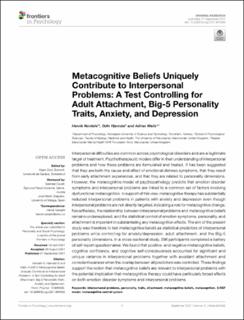| dc.contributor.author | Nordahl, Henrik | |
| dc.contributor.author | Hjemdal, Odin | |
| dc.contributor.author | Wells, Adrian | |
| dc.date.accessioned | 2021-09-20T07:28:49Z | |
| dc.date.available | 2021-09-20T07:28:49Z | |
| dc.date.created | 2021-09-02T11:07:23Z | |
| dc.date.issued | 2021 | |
| dc.identifier.citation | Frontiers in Psychology. 2021, 12, . | en_US |
| dc.identifier.issn | 1664-1078 | |
| dc.identifier.uri | https://hdl.handle.net/11250/2779020 | |
| dc.description.abstract | Interpersonal difficulties are common across psychological disorders and are a legitimate target of treatment. Psychotherapeutic models differ in their understanding of interpersonal problems and how these problems are formulated and treated. It has been suggested that they are both the cause and effect of emotional distress symptoms, that they result from early attachment experiences, and that they are related to personality dimensions. However, the metacognitive model of psychopathology predicts that emotion disorder symptoms and interpersonal problems are linked to a common set of factors involving dysfunctional metacognition. In support of this view, metacognitive therapy has substantially reduced interpersonal problems in patients with anxiety and depression even though interpersonal problems are not directly targeted, indicating a role for metacognitive change. Nevertheless, the relationship between interpersonal problems and metacognitive beliefs remains underexplored, and the statistical control of emotion symptoms, personality, and attachment is important in substantiating any metacognition effects. The aim of the present study was therefore to test metacognitive beliefs as statistical predictors of interpersonal problems while controlling for anxiety/depression, adult attachment, and the Big-5 personality dimensions. In a cross-sectional study, 296 participants completed a battery of self-report questionnaires. We found that positive- and negative-metacognitive beliefs, cognitive confidence, and cognitive self-consciousness accounted for significant and unique variance in interpersonal problems together with avoidant attachment and conscientiousness when the overlap between all predictors was controlled. These findings support the notion that metacognitive beliefs are relevant to interpersonal problems with the potential implication that metacognitive therapy could have particularly broad effects on both emotion disorder symptoms and interpersonal problems. | en_US |
| dc.language.iso | eng | en_US |
| dc.publisher | Frontiers Media | en_US |
| dc.rights | Navngivelse 4.0 Internasjonal | * |
| dc.rights.uri | http://creativecommons.org/licenses/by/4.0/deed.no | * |
| dc.title | Metacognitive beliefs uniquely contribute to interpersonal problems: A test controlling for adult attachment, big-5 personality traits, anxiety and depression | en_US |
| dc.type | Peer reviewed | en_US |
| dc.type | Journal article | en_US |
| dc.description.version | publishedVersion | en_US |
| dc.source.volume | 12 | en_US |
| dc.source.journal | Frontiers in Psychology | en_US |
| dc.identifier.doi | https://doi.org/10.3389/fpsyg.2021.694565 | |
| dc.identifier.cristin | 1930742 | |
| dc.description.localcode | Copyright © 2021 Nordahl, Hjemdal and Wells. This is an open-access article distributed under the terms of the Creative Commons Attribution License (CC BY). The use, distribution or reproduction in other forums is permitted, provided the original author(s) and the copyright owner(s) are credited and that the original publication in this journal is cited, in accordance with accepted academic practice. No use, distribution or reproduction is permitted which does not comply with these terms. | en_US |
| dc.source.articlenumber | 694565 | en_US |
| cristin.ispublished | true | |
| cristin.fulltext | original | |
| cristin.qualitycode | 1 | |

